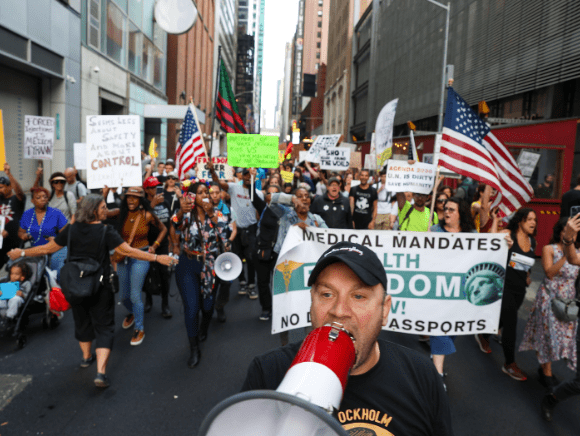Imagine nearly half the American workforce quitting or getting fired. All at once. While the country is already suffering an employee shortage crisis, no less. According to vaccine tracking by the Mayo Clinic, only about 57% of U.S. adults are fully inoculated. As the Biden administration’s vaccine mandate begins to be enforced by companies nationwide, all those unvaccinated employees who refuse to comply must be let go. How will companies – or government agencies, for that matter – survive the loss of half, or even one-third, of their employees?
As the various deadlines approach, one simple question must be asked: Will all who refuse to comply really get fired? OSHA is set to levy $14,000 fines for each employee who isn’t vaccinated, doesn’t test regularly, and doesn’t seek and win an exemption for health or religious reasons – and should the Build Back Better Act become law, that goes up to $70,000 per employee, or as much as $700,000 for “willful or repeated violations.” How many businesses can afford to pay those fines and survive? On the other hand, how many can afford to fire such a chunk of their staff?
Meet the Deadlines, or Else … What?
 According to Stars and Stripes, as of October 10, “[h]undreds of thousands of U.S. service members remain unvaccinated or only partially vaccinated against the coronavirus as the Pentagon’s first compliance deadline nears.” The Navy has 90% compliance, but only 72% of Marines are vaccinated. The deadline for both branches is November 28. The Air Force has the DoD’s most ambitious deadline – they must be fully vaccinated in just a few weeks – but still, more than 60,000 aren’t. The Army deadline is December 15, but the branch still has a way to go. While 81% of active-duty troops are fully vaccinated, barely 40% of the Guard and Reserves are. So what will the U.S. military look like in 2022? Will we still boast 2.1 million troops – or will the DoD actually give all these non-compliant soldiers the boot?
According to Stars and Stripes, as of October 10, “[h]undreds of thousands of U.S. service members remain unvaccinated or only partially vaccinated against the coronavirus as the Pentagon’s first compliance deadline nears.” The Navy has 90% compliance, but only 72% of Marines are vaccinated. The deadline for both branches is November 28. The Air Force has the DoD’s most ambitious deadline – they must be fully vaccinated in just a few weeks – but still, more than 60,000 aren’t. The Army deadline is December 15, but the branch still has a way to go. While 81% of active-duty troops are fully vaccinated, barely 40% of the Guard and Reserves are. So what will the U.S. military look like in 2022? Will we still boast 2.1 million troops – or will the DoD actually give all these non-compliant soldiers the boot?
The deadline for federal contractors is December 8. Union Pacific, Boeing, American Airlines, Southwest Airlines, JetBlue, Alaska Airlines, Spirit AeroSystems, IBM, and Raytheon are all allegedly going to enforce that date, while Amtrak will require its employees to be inoculated by November 22, according to Reuter’s.
For police officers in the city of Chicago, the deadline was Friday, October 15 – and the police union urged officers to ignore the mandate. Mayor Lori Lightfoot has filed a court action against the union – she also said those who showed up to work on Friday unvaccinated wouldn’t be fired, but they would be placed on unpaid leave after the weekend. As Liberty Nation’s Jeff Charles put it, “While it is not clear which party will gain the upper hand in this conflict, it still highlights the overall debate over vaccine mandates.” It raises an interesting question: How many of the city’s 10,000 or so active officers can Chicago afford to send home? And that conundrum is hardly limited to the Windy City. Los Angeles County Sheriff Alex Villanueva told AP News that he wouldn’t force his 18,000 employees to vaccinate, despite the county mandate. “I don’t want to be in a position to lose 5, 10% of my workforce overnight,” he explained.
Moving the Goalposts – or Pulling Them Up Entirely?
The simple truth is that this vaccine mandate isn’t realistically enforceable. Actually carrying out the threat of either terminating all those who refuse to play ball or fining companies out of existence means not only crushing American businesses and crashing the economy entirely but gutting the federal and local governments themselves. Something like 60% of the Army Reserves and National Guard would be discharged. Police officers, firefighters, and medical workers would be let go in droves. Every large company in every industry would be at risk of collapse due to a lack of staff.
So, what will happen as the deadlines arrive? At most, they’ll simply be moved back. That’s the example we have from our neighbors up north. After long insisting Quebec would stand firm behind its vaccine mandate for health care workers, Health Minister Christian Dubé announced Oct. 13 that they would have an extra month. Why? Because he knows – as well as everyone else – that Quebec won’t survive without health care workers. Just as big banks and auto manufacturers got their bailouts because they were “too big to fail,” these “essential workers” will get another chance every time they buck a deadline because they’re too critical to fail. “Get the jab or lose your job” is a scare tactic – and so long as enough folks continue to call the bluff, that’s all it can ever be.
~ Read more from James Fite.





